
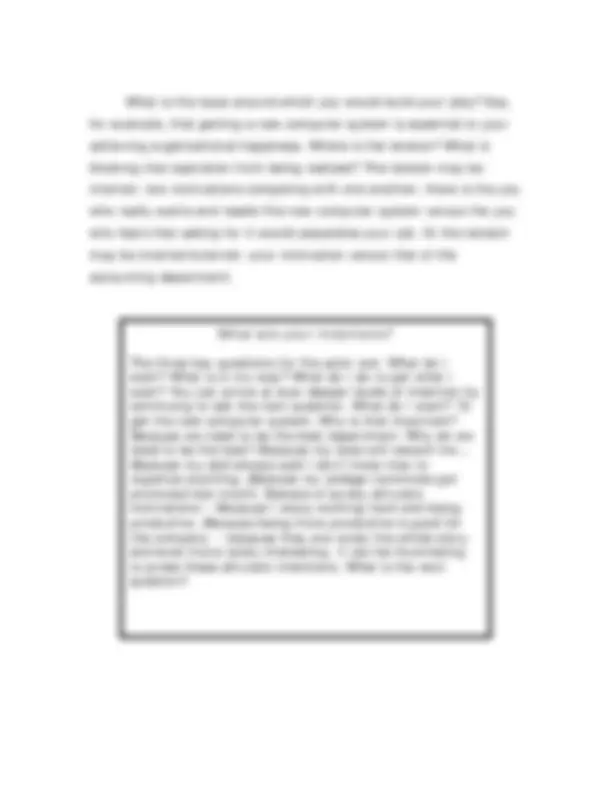
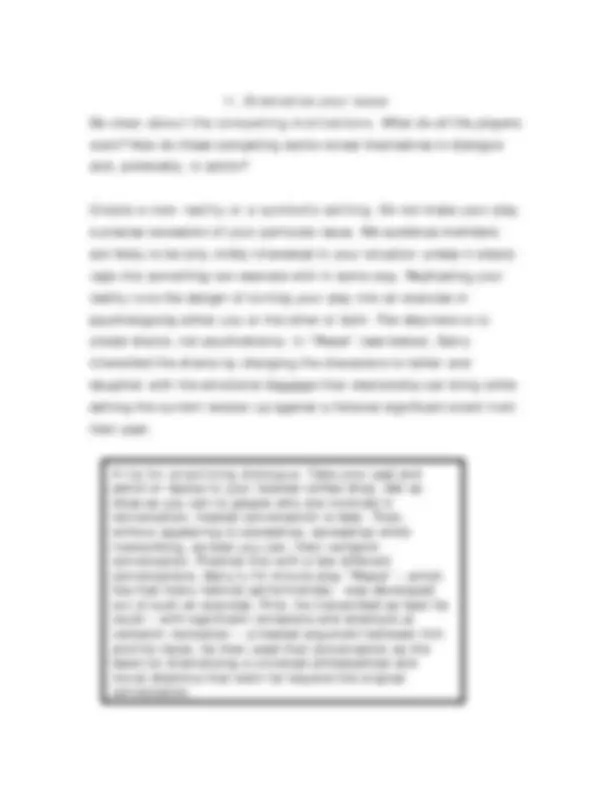
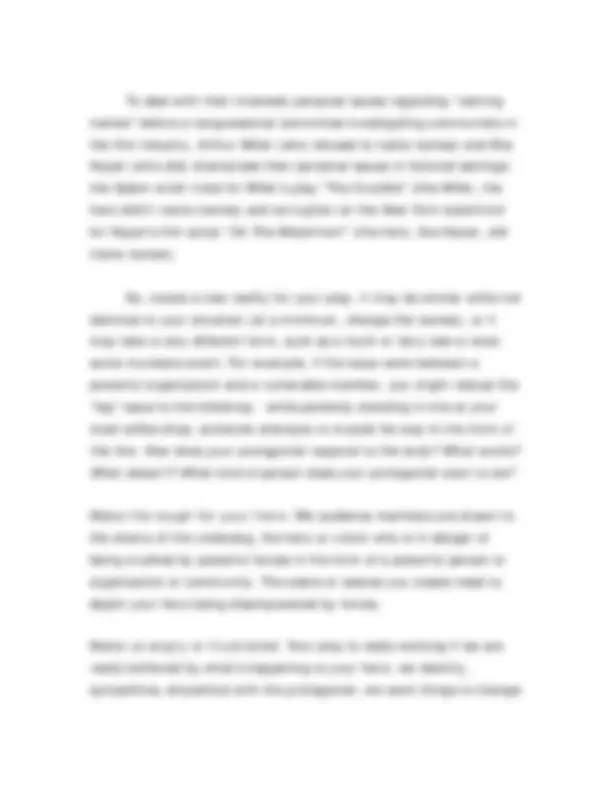
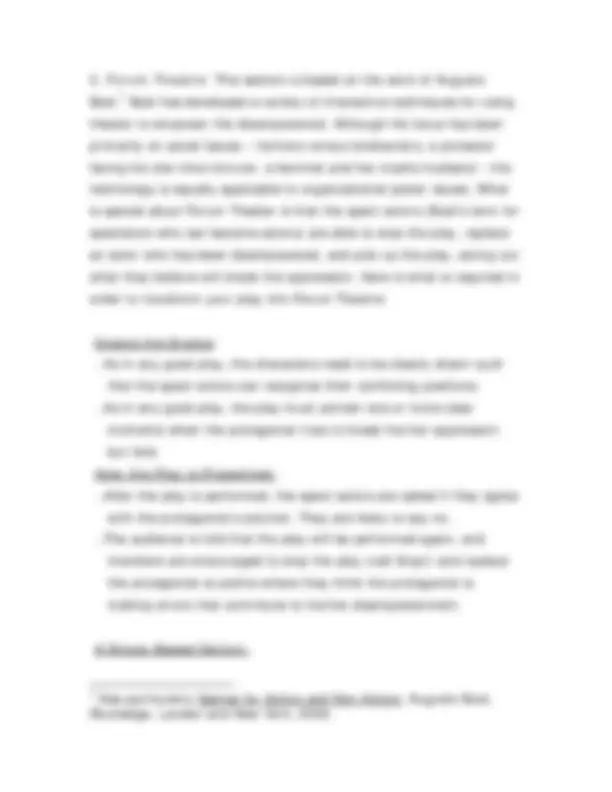
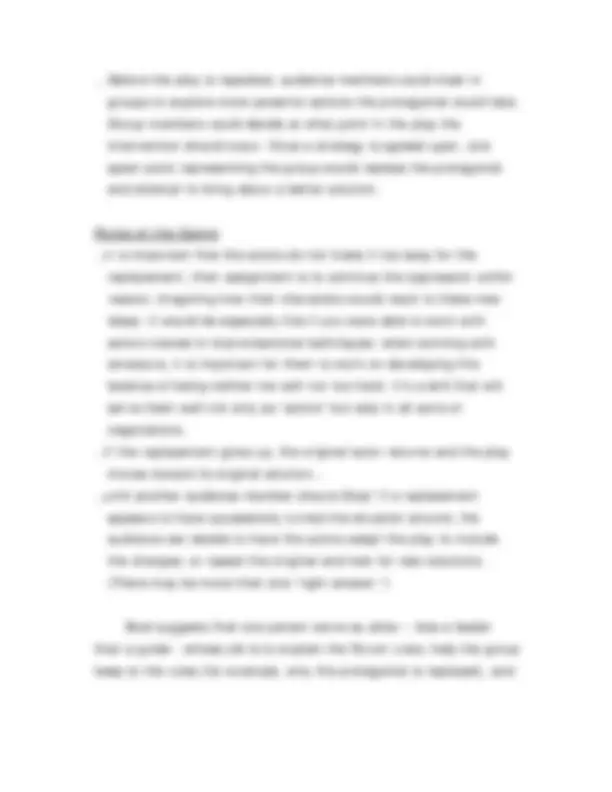
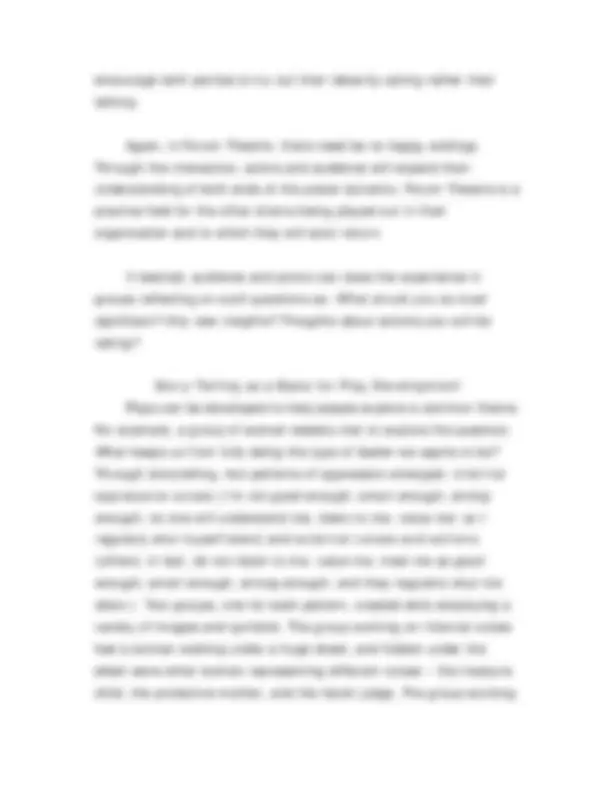
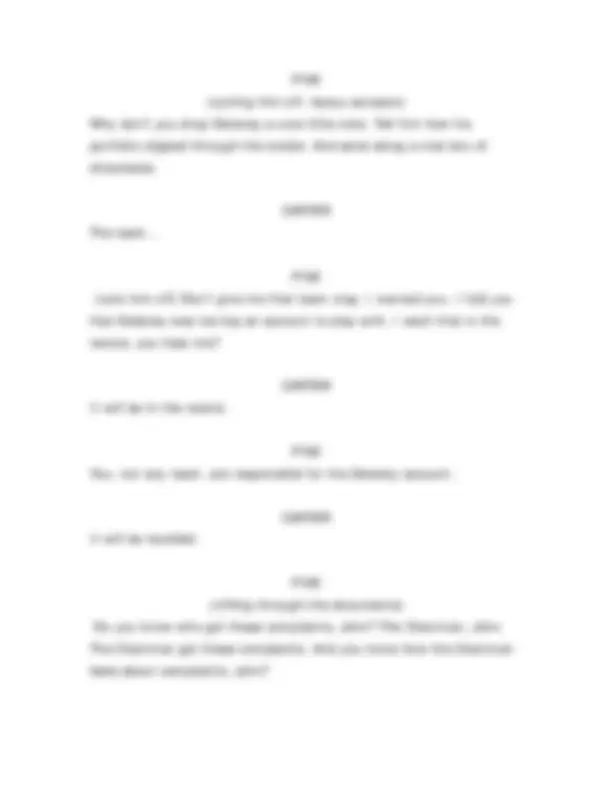
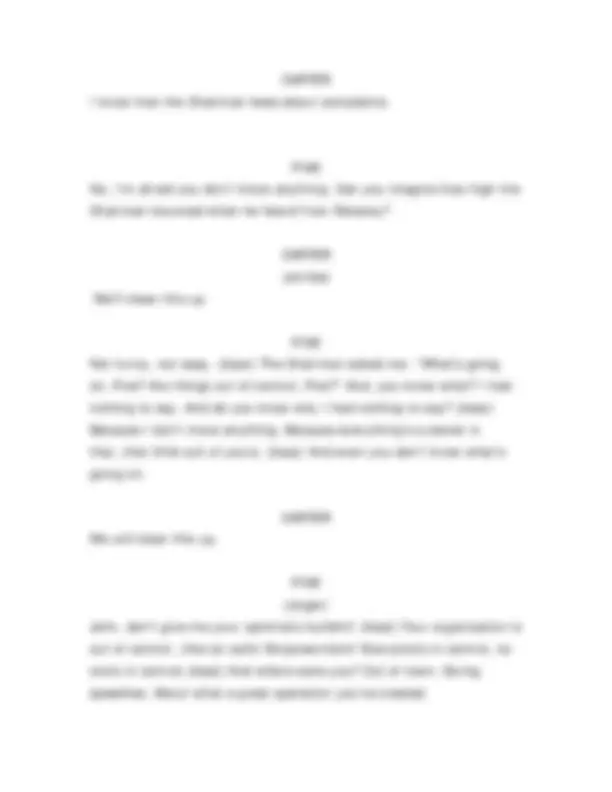
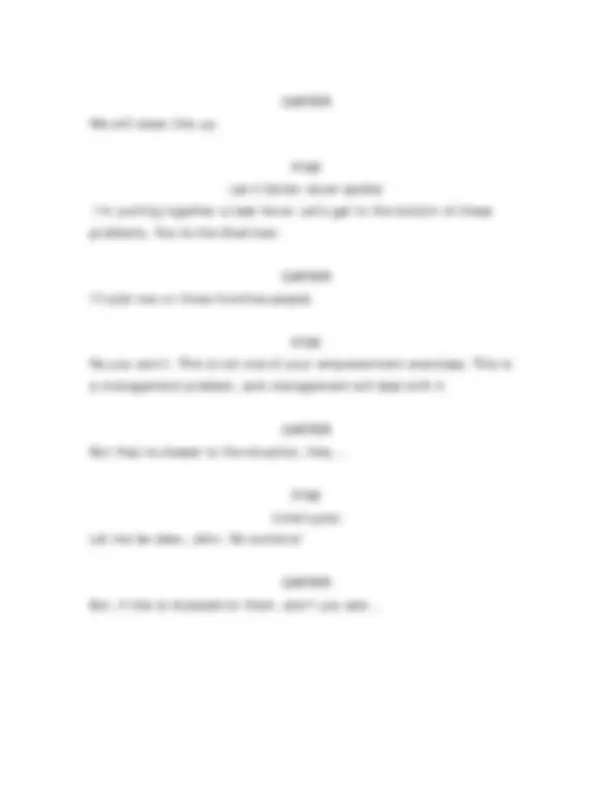



Study with the several resources on Docsity

Earn points by helping other students or get them with a premium plan


Prepare for your exams
Study with the several resources on Docsity

Earn points to download
Earn points by helping other students or get them with a premium plan
Community
Ask the community for help and clear up your study doubts
Discover the best universities in your country according to Docsity users
Free resources
Download our free guides on studying techniques, anxiety management strategies, and thesis advice from Docsity tutors
Trust me; all your life you've been practicing playwriting; in fact,. YOUR LIFE is the play you've been writing: you've been the protagonist; you've been ...
Typology: Study notes
1 / 18

This page cannot be seen from the preview
Don't miss anything!











Write Your Own Play
with Marcia Hyatt, Margy Nelson, and Douglas Scholz-Carlson
Wouldn’t it be wonderful to see a dance piece where in the first half the dancers danced, and in the second they showed the audience how to dance? Wouldn’t it be wonderful to see a musical where in the first half the actors sang, and in the second we all sang together?
Augusto Boal Games for Actors and Non-Actors
O.K., you’ve had the opportunity to read Barry’s organization plays, maybe to watch them being performed, and possibly even acted in them yourself; now it’s time to dust off your playwriting skills and create your own organizational drama. I hear you protesting: What playwriting skills? Trust me; all your life you’ve been practicing playwriting; in fact, YOUR LIFE is the play you’ve been writing: you’ve been the protagonist; you’ve been speaking very realistic dialogue; you’ve selected the various sets on which the action has been played out; you’ve chosen some supporting players while others have been thrust upon you; your character and motivation are clear as are the barriers you’ve come up against; stuff has happened, and it’s been nothing but improvisation following improvisation. The playwriting experience is there; all that is now needed is focus.
The essential elements of organization theater are: select an organizational issue, dramatize it, and then play around with it.
I. Select an Issue Or Where is the Conflict? A play about John Carter’s many wonderful accomplishments, regardless of their brilliance, would clear out the audience before the end of act I, scene one. An issue becomes an issue only when there is conflict : something wanting to happen and something blocking it from happening, aspirations up against obstacles, power against power. Carter gets interesting only in relationship to the counter pressures from Cathy, Bronton, and Fine, his motivation up against their motivations.
II. Dramatize your issue Be clear about the competing motivations. What do all the players want? How do these competing wants reveal themselves in dialogue and, preferably, in action?
Create a new reality or a symbolic setting. Do not make your play a precise recreation of your particular issue. We audience members are likely to be only mildly interested in your situation unless it clearly taps into something we resonate with in some way_._ Replicating your reality runs the danger of turning your play into an exercise in psychologizing either you or the other or both. The idea here is to create drama, not psychodrama. In “Peace” (see below), Barry intensified the drama by changing the characters to father and daughter with the emotional baggage that relationship can bring while setting the current tension up against a fictional significant event from their past.
A tip for practicing dialogue. Take your pad and pencil or laptop to your nearest coffee shop. Get as close as you can to people who are involved in conversation, heated conversation is best. Then, without appearing to eavesdrop, eavesdrop while transcribing, as best you can, their verbatim conversation. Practice this with a few different conversations. Barry’s 10-minute play “Peace” – which has had many festival performances - was developed out of such an exercise. First, he transcribed as best he could – with significant omissions and attempts at verbatim recreation – a heated argument between him and his niece; he then used that conversation as the basis for dramatizing a universal philosophical and moral dilemma that went far beyond the original conversation.
To deal with their intensely personal issues regarding “naming names” before a congressional committee investigating communists in the film industry, Arthur Miller (who refused to name names) and Elia Kazan (who did) dramatized their personal issues in fictional settings: the Salem witch trials for Miller’s play “The Crucible” (like Miller, the hero didn’t name names) and corruption on the New York waterfront for Kazan’s film script “On The Waterfront” (the hero, like Kazan, did name names).
So, create a new reality for your play; it may be similar while not identical to your situation (at a minimum, change the names), or it may take a very different form, such as a myth or fairy tale or even some mundane event. For example, if the issue were between a powerful organization and a vulnerable member, you might reduce the “big” issue to the following: while patiently standing in line at your local coffee shop, someone attempts to muscle his way to the front of the line. How does your protagonist respond to the bully? What works? What doesn’t? What kind of person does your protagonist want to be?
Make life tough for your hero. We audience members are drawn to the drama of the underdog, the hero or victim who is in danger of being crushed by powerful forces in the form of a powerful person or organization or community. The scene or scenes you create need to depict your hero being disempowered by forces.
Make us angry or frustrated. Your play is really working if we are really bothered by what’s happening to your hero; we identify, sympathize, empathize with the protagonist; we want things to change
This will yield rich material to work with in ways that enable members to see and experience these issues in action.
Playing with Plays The purpose of plays is to involve us emotionally and intellectually in issues of importance; the goal is to stimulate new thinking and prod us into action. At their best, plays move past entertainment to personal empowerment. The following are some ways
3. Forum Theatre. This section is based on the work of Augusto Boal.^1 Boal has developed a variety of interactive techniques for using theater to empower the disempowered. Although his focus has been primarily on social issues – farmers versus landowners, a protestor facing his one-time torturer, a feminist and her macho husband – the technology is equally applicable to organizational power issues. What is special about Forum Theater is that the spect-actors (Boal’s term for spectators who can become actors) are able to stop the play, replace an actor who has been disempowered, and pick up the play, acting out what they believe will break the oppression. Here is what is required in order to transform your play into Forum Theatre:
Create the Drama : …As in any good play, the characters need to be clearly drawn such that the spect-actors can recognize their conflicting positions. …As in any good play, the play must contain one or more clear moments when the protagonist tries to break his/her oppression but fails. How the Play is Presented : …After the play is performed, the spect-actors are asked if they agree with the protagonist’s solution. They are likely to say no. …The audience is told that the play will be performed again, and members are encouraged to stop the play (call Stop!) and replace the protagonist at points where they think the protagonist is making errors that contribute to his/her disempowerment.
A Group-Based Option :
(^1) See particularly Games for Actors and Non-Actors, Augusto Boal, Routledge, London and New York, 2002.
encourage both parties to try out their ideas by acting rather than talking.
Again, in Forum Theatre, there need be no happy endings. Through the interaction, actors and audience will expand their understanding of both ends of the power dynamic. Forum Theatre is a practice field for the other drama being played out in their organization and to which they will soon return.
If desired, audience and actors can close the experience in groups reflecting on such questions as: What struck you as most significant? Any new insights? Thoughts about actions you will be taking?
Story-Telling as a Basis for Play Development Plays can be developed to help people explore a common theme. For example, a group of women leaders met to explore the question: What keeps us from fully being the type of leader we aspire to be? Through storytelling, two patterns of oppression emerged: internal oppressive voices ( I’m not good enough, smart enough, strong enough; no one will understand me, listen to me, value me; so I regularly shut myself down) and external voices and actions ( others, in fact, do not listen to me, value me, treat me as good enough, smart enough, strong enough; and they regularly shut me down.) Two groups, one for each pattern, created skits employing a variety of images and symbols. The group working on internal voices had a woman walking under a huge sheet, and hidden under the sheet were other women representing different voices – the insecure child, the protective mother, and the harsh judge. The group working
on external voices and actions used costuming to depict a wild woman, wild over not being heard; neckties and vests representing the oppressive dominant culture; positioning – having the boss elevated and standing while the others are sitting.
Each group performed its play for the other, then Forum Theatre was used to explore how one could move through both the internal and external oppression.
Consider how these Forum Theatre principles could be applied to the following scene from Hierarchy. Where, as spect-actor, would you shout STOP! and prepare to step through the screen.
(Carter and Fine in Fine’s office)
FINE (furious, shaking memos in Carter’s face) What the hell is going on?…Sit down! (Carter sits while Fine stands over him.) Do you know what these are? (no response) Customer complaints, John. Customer complaints. (He riffles through the papers, finds what he is looking for.) Here. Five single-spaced pages. Pure rage.
CARTER Who?
FINE You don’t know, do you? You’ve never seen this report, have you?
(cutting him off; heavy sarcasm) Why don’t you drop Delaney a cute little note. Tell him how his portfolio slipped through the cracks. And send along a nice box of chocolates.
CARTER The team…
FINE (cuts him off) Don’t give me that team crap. I warned you. I told you that Delaney was too big an account to play with. I want that in the record, you hear me?
CARTER It will be in the record.
FINE You, not any team, are responsible for the Delaney account.
CARTER It will be handled.
FINE (riffling through the documents) Do you know who got these complaints, John? The Chairman, John. The Chairman got these complaints. And you know how the Chairman feels about complaints, John?
I know how the Chairman feels about complaints.
No, I’m afraid you don’t know anything. Can you imagine how high the Chairman bounced when he heard from Delaney?
CARTER (smiles) We’ll clean this up.
FINE Not funny, not easy. (beat) The Chairman asked me: “What’s going on, Fine? Are things out of control, Fine?” And, you know what? I had nothing to say. And do you know why I had nothing to say? (beat) Because I don’t know anything. Because everything’s a secret in that…that little cult of yours. (beat) And even you don’t know what’s going on.
CARTER We will clean this up.
FINE (anger) John, don’t give me your optimistic bullshit! (beat) Your organization is out of control. (like an oath) Empowerment! Everyone’s in control, no one’s in control. (beat) And where were you? Out of town. Giving speeches. About what a great operation you’ve created.
This is your problem, not theirs. I want you to get in there…now! Roll up your sleeves and get control of this. No workers, John. Management. Think management.
Marcia Hyatt. Marcia is both an accomplished organizational development consultant and trainer (winner of the Minnesota Organization Development Practitioner of the Year Award) and an accomplished actor who stage credits include Florence in The Odd Couple , Prudence in Beyond Therapy , Agnes in A Delicate Balance. Marcia is co-founder of Waterline Consulting focusing on new forms of organizational learning including kinesthetic brainstorming, story telling, and interactive theater projects. Marcia conducts and trains others to conduct The Organization Workshop and she has served as anthropologist for Power Lab. Marcia was instrumental in bringing What a Way to Make a Living to the stage and she stars regularly as Angel Laurie.
Margy Nelson. Margy was an original core member of Augusto Boal’s Center for Theater of the Oppressed in France in the mid-1970s. She worked with Boal as a workshop teacher, editor of the Center’s quarterly review, and performer. She worked extensively to clarify and systematize Boal’s techniques and taught and performed with him throughout Europe, North America and Brazil. For the past eight years, Margy has been presenting a broad range of theater programs in the USA and Mexico. She works with Marcia Hyatt, Douglas Scholtz- Carlson, and the Seeing System Players on a variety of kinesthetic brainstorming and theater projects.
Douglas Scholz-Carlson. Doug has appeared on stages including the Seattle Repertory Theatre, Guthrie Theatre, Great River Shakespeare Festival, Ordway Music Theatre, Minnesota Opera, Seattle Children’s Theatre, Seattle Civic Light Opera, and Shakespeare in the Parks (Minneapolis). His directing credits include productions for the